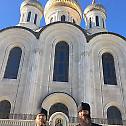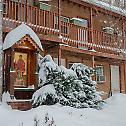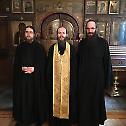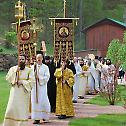“We Work Out Our Salvation Together”
A Conversation with Two Monks from the Hermitage of the Holy Cross
Fr. Macarius (Ruegemer) and Fr. David (Mahand) are monks from the Hermitage of the Holy Cross in West Virginia. Fr. Macarius is a hierodeacon and Fr. David is a riassophore monk. Their abbot blessed them to travel to Russia to see and experience the monastic life there, first staying at Sretensky Monastery for a week, having been invited by one of the brethren, and then to visit Optina for two weeks. In this interview, we spoke with them about life in their monastery, the formation of novices, and the spiritual advice, and above all, spiritual joy that they receive from their abbot, Archimandrite Seraphim.
—Fr. David and Fr. Macarius, can you tell us a bit about your monastery?
—Fr. David: The monastery was founded in 1986 by Hieromonk Kallistos, who was a Greek-American hieromonk serving a parish in the Russian Church Abroad. He asked the bishop if he could have a blessing to start a small brotherhood and a small sisterhood because there were some men and some women interested in the monastic life, and so Vladyka Alipy blessed him to found a brotherhood and sisterhood. Fr. Kallistos asked if the brotherhood could be dedicated to the Exaltation of the Cross. Vladyka Alipy said yes, but that there should also be a patron saint, someone who the monks could have a relationship with and ask for prayers from, so Vladyka Alipy gave us St. Panteleimon, whom we consider our patron saint.
—What is life like at your monastery?
—Fr. David: We live in the woods basically. The topography of West Virginia is very unique. If you could see it from the sky, it would be like waves of land, with rich lines and valleys, very compressed. We live on top of a hill but also in a valley at the same time if that makes sense (laughs).
—What is a typical day like at the monastery?
—Fr. Macarius: We do morning prayers in our cells privately and then we gather at 5:00 AM in the church for Matins, First Hour and Typika or Liturgy. If there’s Typika, it finishes around 7, or if there's Liturgy then at 8, and then there’s an optional breakfast for the monks; then they go to their cell and do their cell rule. At 9 we read the Third Hour; the brothers will gather in their various areas of obedience and do the Third Hour together, and then they continue with their obediences. Then at noon we all gather in church for the Sixth Hour and then we go to trapeza for lunch, and then obediences again. Some might start to work earlier, but generally 1:30 is when the obediences start, and then at 5 we have Ninth Hour and Vespers followed by dinner. At 6:30 we have Small Compline and then the monks are free to chat or go straight to their cell; we have silence that begins at 9 PM, lasting until 9 AM.
—Can you tell us a bit more about the different obediences at your monastery?
—Fr. Macarius: There are various obediences; of course, anything to support our daily life. Some cook; some bake—we have a bakery now and we sell kulich and pound cake and we’re going to sell some more items there. We also have a goat farm, chickens, and a vegetable garden. We have a librarian, a guest master, and there are cemetery caretaking duties. We dip our own candles and make incense. We have a gift shop with someone working there and doing the shipping.
—What form of chant do you use during services?
—Fr. David: We use Znamenny chant for all eight tones, and for special settings we’re very fond of Georgian chant, and we occasionally use Byzantine settings and Kievan and Obikhod tones.
—How many hieromonks, hierodeacons, and monks are at your monastery?
—Fr. Macarius: We have twenty-seven monks. Twenty-five are at the monastery, and we also have one nun. We don’t have a convent, but she was in some way the first member of the community. She was a widow who was under Fr. Kallistos and she’s been there ever since. Of the twenty-five monks, four are hieromonks, and including our abbot Archimandrite Seraphim, there will be five in August, God-willing. We have an archdeacon and one deacon, myself. There are probably about half a dozen stavrophore monks, half a dozen riassophore1 monks, half a dozen novices, and a couple of candidates.
—Are there any particular spiritual books a novice is given to read before being tonsured?
—Fr. David: Can you remember all forty books on the novice list?
Fr. Macarius: No (laughs), but number one on the list is Abba Dorotheos. Every novice should read that first. Even if they read it before the monastery, they would be encouraged to read it at the beginning of their novitiate.
Fr. David: We also hear it every year because we read Abba Dorotheos during the first two weeks of lent.
Fr. Macarius: And it’s encouraged for everybody to read a page of St. Isaac the Syrian a day.
—Maybe you could list some of the main books that you can remember?
—Fr. David: Definitely the lives of all the Optina elders and lots of books by Fr. Seraphim (Rose)—a lot of publications of St. Herman’s monastery. For example, they publish a series called “The Little Russian Philokalia” like the lives of St. Paisius Velichkovsky, St. Seraphim of Sarov, and St. Theodore of Synaxar. The lives of the saints there are not the same as in the Synaxarion—it’s the lives of the saints along with their teachings. For example, in The Little Russian Philokalia of St. Seraphim of Sarov it has his life and his conversation with Motovilov, but it also has his teachings about monasticism. It’s the same with St. Paisius Velichkovsky. We also read St. Ignatius Brianchaninov’s The Arena and St. Theophan the Recluses’ Art of Prayer put together by Igumen Chariton. We read a lot of St. Theophan the Recluse and St. Ignatius Brianchaninov.
—Are there times when the abbot gathers the brotherhood together to talk about the spiritual life and answer questions?
—Fr. Macarius: We’ve had only a few talks unfortunately because of his health and just being so overrun with business; so we don’t have that as much as he would like and as much as we would like, but every time we have them it’s very edifying and it really draws the brothers in. We have them two or three times a year.
—Is there any particular spiritual advice you remember that he’s shared during one of these talks?
—Fr. David: Fr. Seraphim strongly emphasized that obedience and humility are the cornerstones of our monastic life. Unfortunately, we have had people who came to the monastery and subsequently left. For those people the most important thing, in their mind, was extreme silence, extreme fasting, but to the point of not being openhearted to your brothers, having a spirit of love. We’re a cenobitic monastery, not a hesychasterion.2 We work out our salvation together, we serve each other, and we try to love each other.
Fr. Macarius: There’s something that the previous igumen had said to me early on as a novice, which I think encapsulates the whole spirit of our current abbot Fr. Seraphim and what he wants. I was telling him about being too distracted and how I couldn’t pray and be quiet and how I thought maybe people talked too much or something. He said one thing that had three parts: “Here we don’t have any great hesychasts or ascetics, we don’t have any great fasters or anything and no one is claiming to be one, but what we have here is brotherhood,” and that’s one of the things Fr. Seraphim has said. He emphasizes the aspect of brotherly unity as being the most important thing according to St. Anthony the Great: “Your brother is your life. If you have gained your brother, you have gained Christ.” He said that’s the most important thing for him, probably because in all his monastic experience prior to Holy Cross he didn’t sense that in the other monasteries and felt that it was missing, and he sees that as the spirit of the cenobitic life; he’s very adamant about it.
Fr. David: I’ve heard priests who’ve known him for a long time speak about him. One priest in particular pointed out to me that the whole monastery is stamped with the kindness of Fr. Seraphim. He’s a very kind spirit, a very kind person; caring, loving, kind, meek. Apparently we’re all stamped with that. I didn’t know that though! (laughs)
Fr. Macarius: When the situation calls for it, he can give very, very specific and very powerful, straightforward exhortations and advice. But one thing he always emphasizes is to keep your eyes fixed on Christ.
—What does he mean by that, to keep your eyes fixed on Christ?
—Fr. Macarius: To always pray to Him and ask Him for everything. He uses the image from the Gospel about the waves running around the ship and the apostles looking at everything else. It’s a lifelong process of trying to just trust in Christ. When we come to Fr. Seraphim, we usually want simple answers or we want an immediate fix or we want him to solve all our problems with some word, but generally it’s always the simple advice of, “Ask God for His grace; He’ll give you everything.” This is always the essence of it; he’s not turning us towards himself but is always pointing the way to seeking Christ’s will, judgment, and time. Before he absolves us in confession he always asks us if we’re at peace with everybody, just to make sure we’re not approaching the Holy Chalice with any sort of grudge. And mainly because we’re dedicated to the Holy Cross he says, “This is your cross, you need to bear your cross.” Again, Fr. Seraphim is very simple in his advice and he leads more by his character, more by his prayer than one could with many fluent words. But when he does speak, his words have very strong spiritual power—simple, but very spiritually powerful because they’re coming out of a heart full of love.
Fr. David: Fr. Seraphim is very fond of saying to those of us who sometimes struggle with despondency or struggle with the thought that we’ll never change, we’ll never overcome our passions, that “Lazarus was four days dead and stinking, and the Lord brought him back to life.”
—Are you from an Orthodox Christian background?
—Fr. Macarius: No, I was raised Protestant, but my parents taught me that Christ is the Savior and God and that it’s important pray to Him, to read the Scriptures, and to go to church.
Fr. David: No, I was also Protestant.
—How did you find your way to the Orthodox Church?
—Fr. Macarius: Looking back on it, the simple answer is that it was definitely the grace and enlightenment of God. I fell away from the Christian life and when I came back I started reading some of the Church Fathers. St Ignatius of Antioch, one of the Apostolic Fathers, definitely settled with me; he kind of showed me that there was this idea of bishops, priests, deacons, and the Holy Eucharist. I slowly made my way through reading about Catholic mystics and writers, Thomas Merton being one who spoke about the Eastern tradition and the Desert Fathers and about the Jesus Prayer.
Fr. David: God’s grace. It was truly a miracle and as every year of my life passes by it gets harder to answer this question because I see God’s providence guiding me to His Church and guiding me to the monastic life. I grew up in a somewhat conservative Christian family but began to realize when I went off to college that the Gospels that I was taught were larger than the church in which I was taught them. So there was some kind of deep, perhaps even semi-unconscious need to find the Church that could contain the Gospels, and I think probably because of my mothers’ and grandmothers’ prayers I was led to meet some Orthodox Christians who invited me to go to their church. I started going, and after I started reading I basically arrived at the point where I thought, “Wouldn’t it be nice if this were true!”
But as we know, faith is a gift of God, so I couldn’t just force myself to believe it. But right after that I had a few gentle “slaps,” you could say, from God: I got into a car accident; I was very embarrassed, my ego was humbled for just a little bit, and it was during that time that the scales fell from my eyes, so to speak. I was reading about Orthodoxy one day and began to believe it. It was a miracle for me. I just continued going to Church and was received into the Church.
—What made you both decide to travel to Russia?
—Fr. David: Obedience (laughs). Fr. Seraphim sent us.
Fr. Macarius: Fr. Seraphim has long had a desire to establish a connection with Russian monasticism in general, and with Optina in particular.
—You’ve been in Russia for almost a week now. What are your impressions so far?
—Fr. Macarius: We haven’t had too much interaction outside the monastery. We feel very at home here at the monastery, to put it simply. I don’t understand most of what’s being said, but the body language and people’s presence and reception of us is just very warm and I don’t feel like I’m an outsider of another culture or from another country; and I don’t perceive the brothers or the people here as foreigners myself. That’s just my own experience.
Fr. Macarius: In America, because our roots are not usually Orthodox, with the whole liturgical life, it’s something that we’re still learning—everybody learns it. But just seeing the people here when they prostrate, or bow down, or how they cross themselves, or how they approach icons and rest their heads on them, you can tell that they’re worshiping God. It’s not just like I cross myself, or I prostrate or bow just because the typikon says to do it at this time—rather, it’s a natural outpouring of the people’s piety and worship of God.
—Do you plan on visiting Russia again in the future? Do you have in mind any other particular places in Russia that you’d especially like to see?
—Fr. David: We plan on doing whatever the abbot tells us. (laughs), but we hope that he’ll bless us to come again. I’d like to. It’s very special for us to come to a place that we’ve read about. We’ve read a lot of lives of saints from all over Russia. For example, there’s a little booklet in English that one of our monks put together from different articles about the New Martyrs and Confessors from Solovki. It starts with the life of St. Hilarion Troitsky and there’s a couple of other lives; so seeing Solovki in real life would be special. Seeing Valaam in real life would be special. Of course, seeing many Russian holy places would be special. Pskov would be extremely special, because we’ve read about those places or even seen those places in the Pskov-Caves video. Just being able to venerate the relics of holy people and go to holy places is a blessing. We have holy places in America, but not on this scale, and especially not with the ancient roots you have here.
—Thank you!
Feodor Nemets
spoke with Fr. Macarius (Ruegemer) and Fr. David (Mahand)





